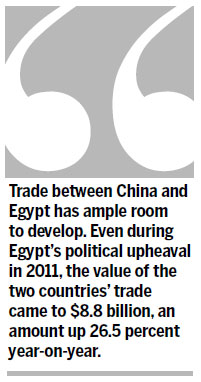
Egypt and China leaders promise to have more trade and economic cooperation to support their development
Egyptian President Mohamed Morsi visited China from Tuesday to Thursday, leading a large delegation consisting of ministers and about 80 Egyptian entrepreneurs. The country was Morsi's first official destination outside the Arab world since he took office in late June. The visit was hailed by the Egyptian media as marking a moment of historic importance.
People in China also valued Morsi's visit. While meeting his Egyptian counterpart, President Hu Jintao said: "You chose China to be one of the first countries to visit after taking office. This shows that you attach great importance to Sino-Egyptian relations. I believe your visit to China will further boost our cooperation in all fields."
Hu noted the important role Egypt has in international and regional affairs and said China has long seen Egypt as a partner in the Arab world and Africa. The two leaders agreed that their countries should uphold the friendship that has long existed between their peoples, cooperate more on various issues and bring the Sino-Egyptian partnership to a new height.
The countries' relations run deep historically. As early as the Bandung Conference, which took place in 1955, former Chinese premier Zhou Enlai had traveled to Myanmar's Yangon airport to meet former Egyptian president Gamal Abdel Nasser, who was there to attend the conference. To help ease the economic difficulties Egypt was then laboring under, China had agreed to buy more than 100 million pounds sterling worth of Egyptian cotton in 1955 and 1956, the largest cotton-trading deal in Egyptian history.
The People's Republic of China and the Arab Republic of Egypt entered into diplomatic relations on May 30, 1956. Egypt was the first Arab and African country to establish diplomatic ties with the New China. Since then, their relations have only become warmer.
In 1999, a strategic and cooperative relationship was established between the two countries. Seven years later, they adopted an outline meant to guide their work to strengthen their partnership. In recent years, under the China-Arab Cooperation Forum and China-Africa Cooperation Forum, China and Egypt have cooperated on a variety of undertakings, including infrastructure construction, agriculture, transport, energy projects and finance.
In 2011, political upheaval in Egypt seriously damaged the Egyptian economy and its tourism industry, which had once provided employment to an eighth of the people in the country's labor force. That year saw the number of visitors coming to Egypt decline by 33 percent. In the second quarter of this year, the country's unemployment rate increased to 12.6 percent, up 0.8 percentage point year-on-year.
The high rates of unemployment and poverty now seen among Egyptian youth are placing further social and security burdens on Egypt. To maintain stability during this period of transition, the Egyptian government has decided to tap its foreign exchange reserves to subsidize purchases of food and fuel. That, in turn, has saddled the country with a huge deficit.
Morsi's trip to China also brought him to the Egypt-China Economic and Business Forum, which was held in Beijing on Tuesday and Wednesday. There with him were 80 Egyptian entrepreneurs, as well as representatives of 200 Chinese enterprises. Brought together, they mainly talked about finding ways to strengthen Sino-Egyptian economic cooperation and encourage Chinese enterprises to invest more into Egypt's energy, agriculture, infrastructure and communications industries.
Trade between China and Egypt has ample room to develop. Even during Egypt's political upheaval in 2011, the value of the two countries' trade came to $8.8 billion, an amount up 26.5 percent year-on-year. That same year, China invested $82.8 million directly into Egypt, a number up 60.4 percent year-on-year. Egypt, being the most populous country in the Arab world and the African continent and having a civilization with roots in ancient times, is blessed with many assets, including tourist attractions and oil, natural gas and other mineral resources. China, for its part, is the world's second-largest economy and has huge foreign-exchange resources and a proven ability to make investments, as well as abundant experience in fighting poverty and in economic development. Strengthening the partnership that exists between the countries will not only promote cooperation in economic and trade, but also give China and its Middle East policy a strategic "pivot" in the Mediterranean region. Moreover, it will support China in its work to further strengthen the friendly ties it now enjoys with Arab and North African countries.
Egypt needs China, and vice-versa. The achievements of Morsi's visit not only are embodied in eight economic and trade cooperation memoranda that the two countries have signed, but also offer reassurance that the Sino-Egyptian partnership will continue to flourish.
The author is director of the African Studies Section of the Chinese Academy of Social Sciences.
(China Daily 08/31/2012 page8)